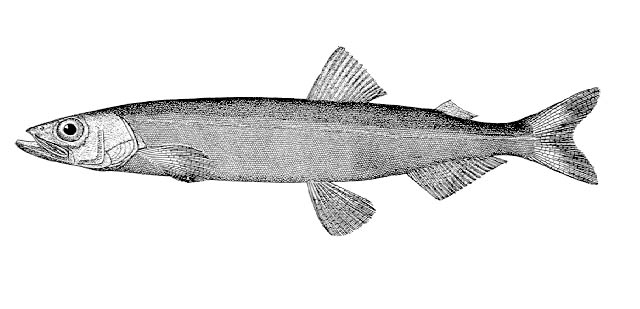The capelin is a small smelt-like forage fish found in the North Atlantic, North Pacific, and Arctic oceans. In the summer, it feeds on dense swarms of plankton at the ice shelf’s edge. Larger capelin consume a lot of krill and other crustaceans. Whales, seals, Atlantic cod, Atlantic mackerel, squid, and seabirds, among others, prey on capelin, especially during the spawning season when the capelin migrate south. Capelin spawn between the ages of two and six years on sand and gravel bottoms or sandy beaches. Capelin have an extremely high post-spawning mortality rate when spawning on beaches, which is close to 100% for males.
Males can grow to be 20 cm (8 in) long, while females can grow to be 25.2 cm (10 in) long. They have an olive dorsal colour that fades to silver on the sides. On both sides of their bodies, males have a translucent ridge. During spawning, the ventral aspects of males are reddish.
Capelin is an important forage fish and the primary food source for Atlantic cod. As a result, the northeast Atlantic cod and capelin fisheries are managed using a multispecies approach developed by the primary resource owners, Norway and Russia.
Dive Report – Details for the 2 June 2022 dive at Middle Cove Provincial Park beach:
Max depth: 34 feet
Dive time: 46 minutes
Water temp: 8°C
Lat/long: 47.650879° N, 52.695970° W
No swell, surf or surge (this location can get pounded by large swell and surf on some days)
We dived one week after the capelin started to “roll” on the beach. This is the annual spawning event for capelin. The beach was full of capelin eggs and dead adult capelin. Hundreds of people come to Middle Cove beach when the capelin spawn to collect capelin for food. Newfoundlanders fry, salt or smoke capelin. Capelin are a keystone prey species in the northwest Atlantic. Capelin are food for northern cod, humpback whales and millions of seabirds that come to nest on coastal islands around Newfoundland each summer. The capelin eggs laid at Middle Cove beach attract hundreds of hungry flounder, sculpins, sea ravens and skate, which eat the eggs.
Neil Burgess
President, Shipwreck Preservation Society of Newfoundland & Labrador







